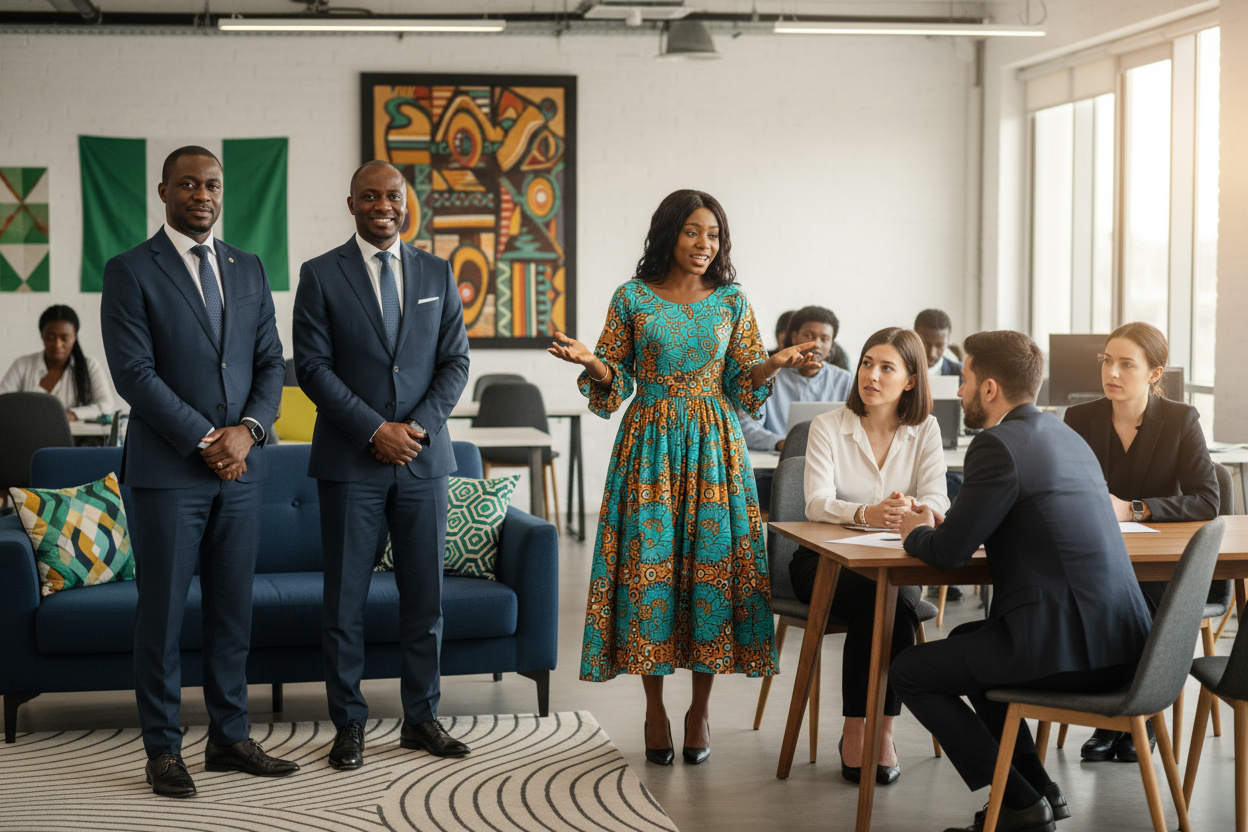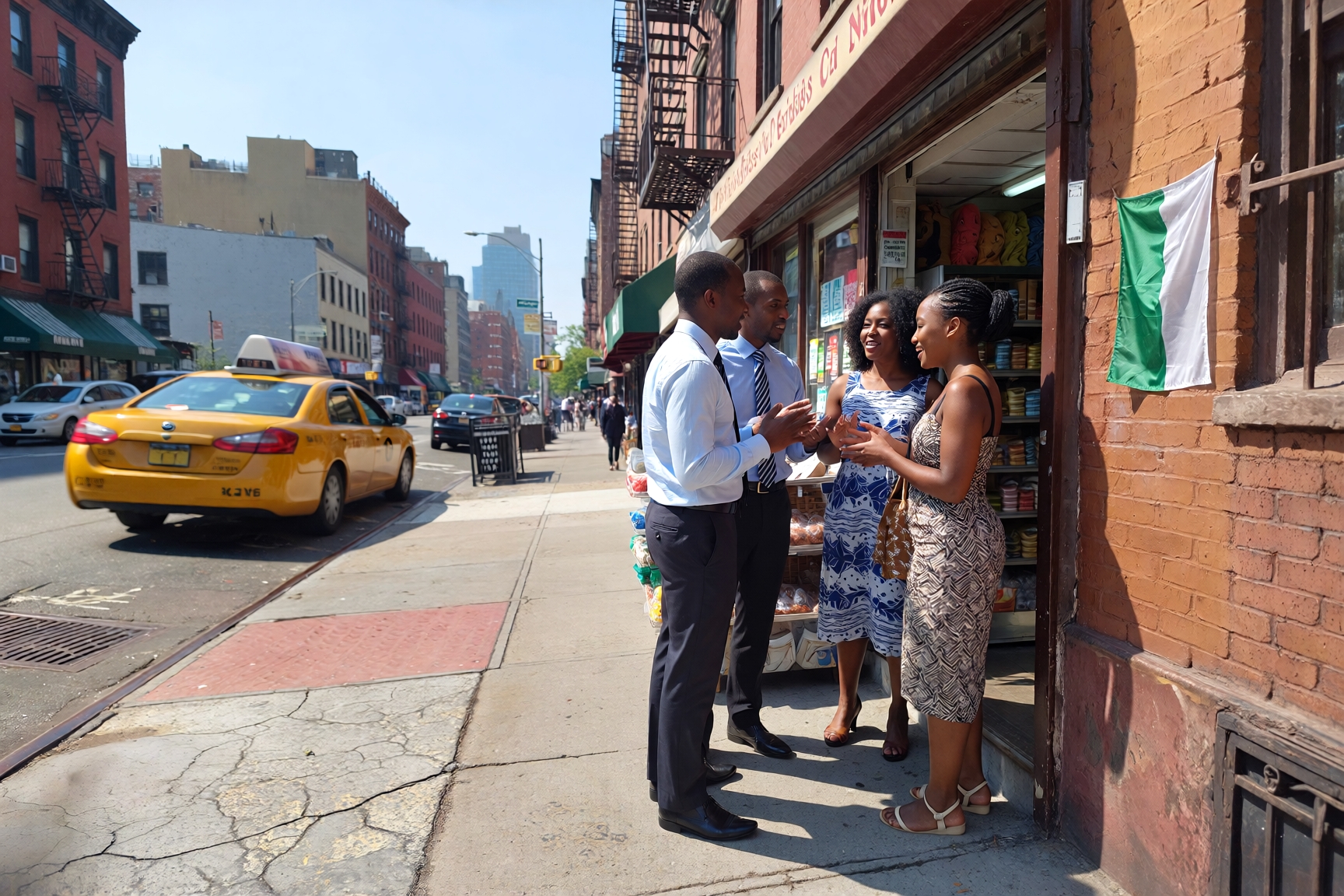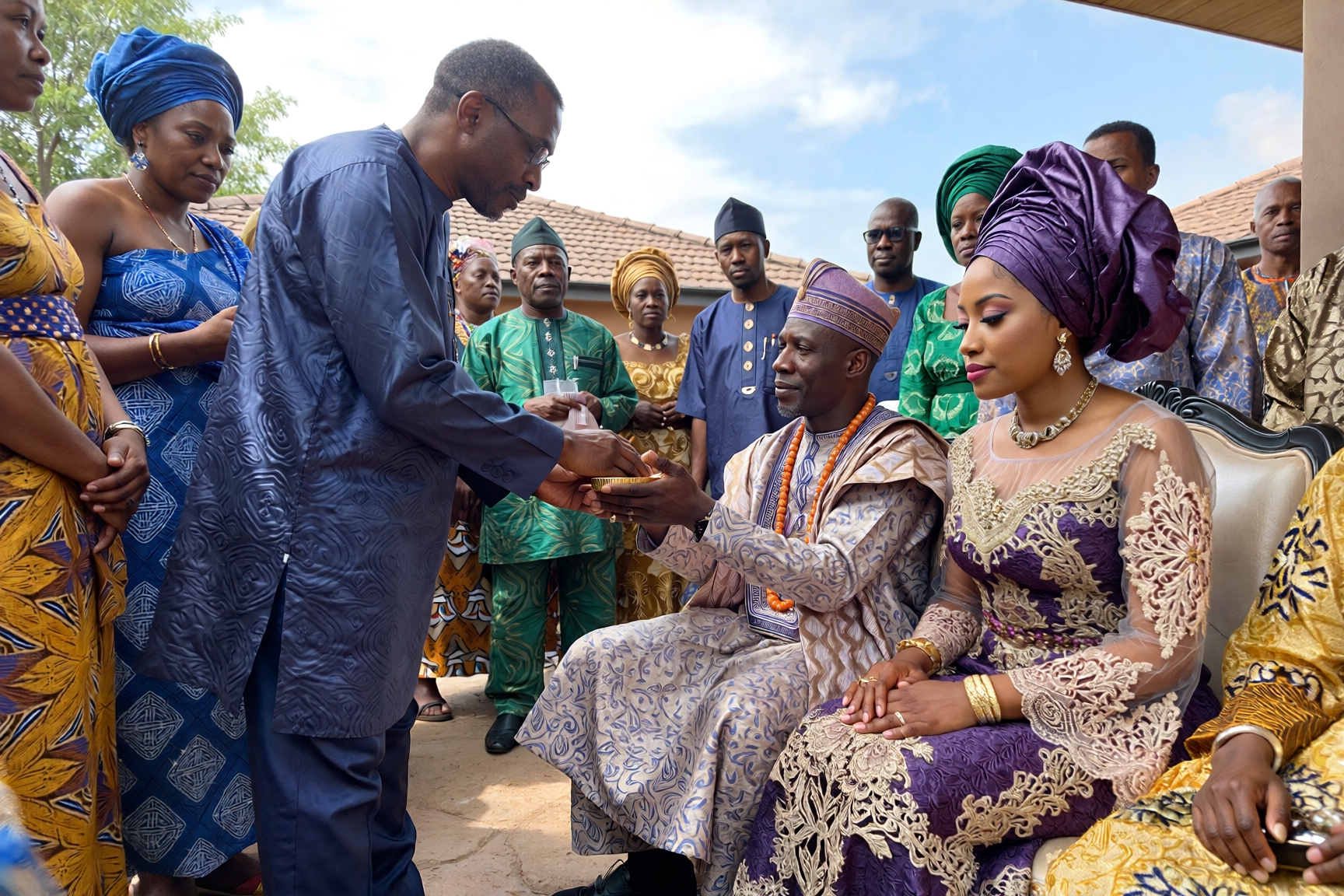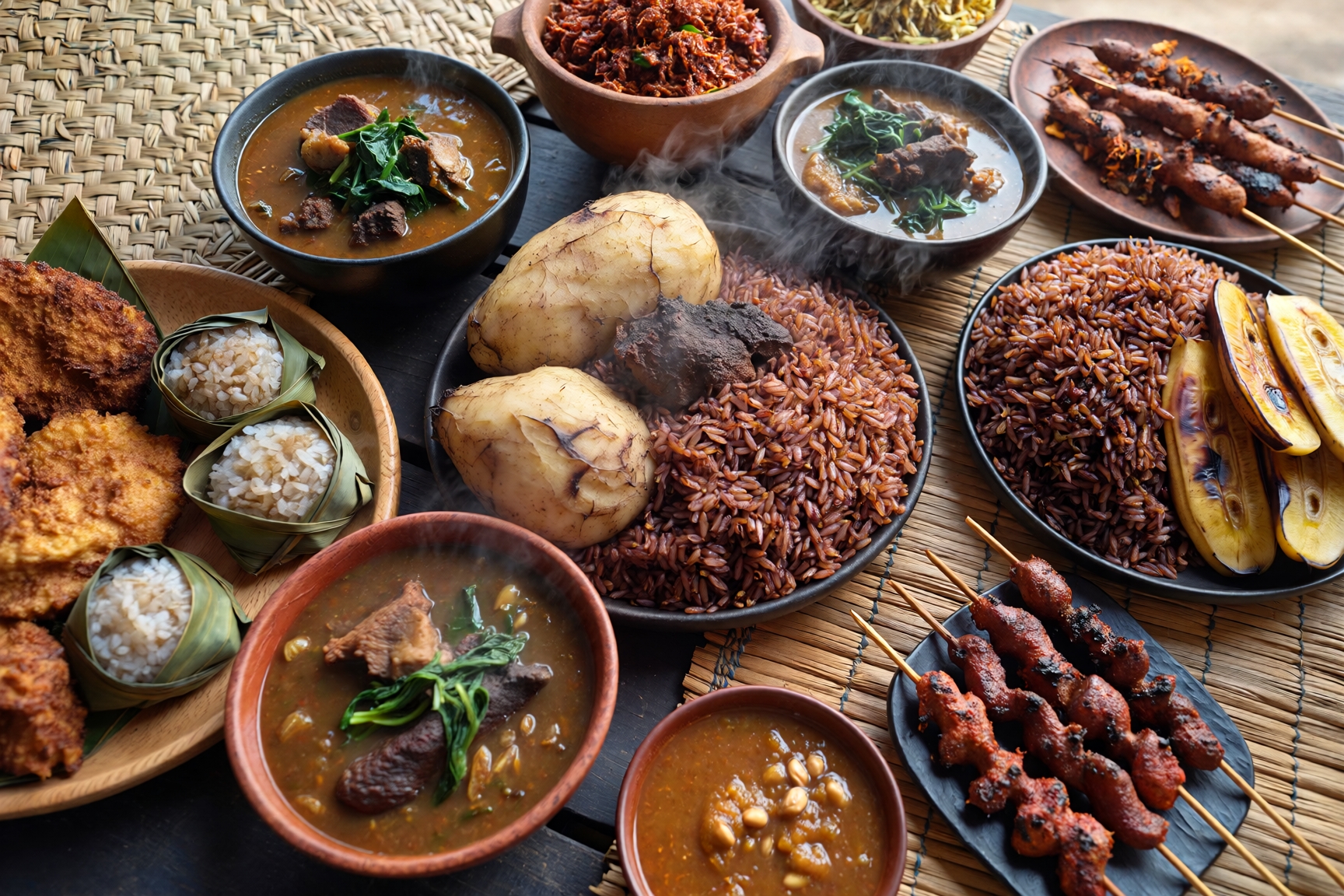If you’ve ever felt your heart sink slightly when introducing yourself as Nigerian to a foreigner, or if you’ve watched someone’s expression shift from neutral to suspicious when they hear your accent, you already understand why this topic matters. What are stereotypes about Nigerians? They range from the laughably absurd to the economically damaging, from outdated colonial hangovers to modern misconceptions amplified by sensational media coverage.
Understanding the Most Common Stereotypes About Nigerians
Let me start with the elephant in the room. The biggest, most persistent, and frankly, most damaging stereotype about Nigerians is the “419 scammer” label.
You know what I find rather fascinating (and deeply frustrating)? The term “Nigerian prince scam” has become so embedded in global consciousness that it’s a punchline in Western comedy shows, a plot device in films, and tragically, a real barrier for legitimate Nigerian entrepreneurs seeking international partnerships. The National Institute for Cultural Orientation works tirelessly to project Nigeria’s true cultural values to counter such negative perceptions.
I once met a brilliant Nigerian software developer in London who told me he lost a contract worth £50,000 simply because the British client “didn’t want to risk working with Nigerians.” Never mind that this developer had impeccable credentials, glowing references, and a portfolio that would make Silicon Valley weep with envy. The stereotype decided his fate before his skills could speak.
But here’s the truth: According to a recent study cited in Business Day, Nigeria suffers an estimated $2.1 billion in annual economic losses due to stereotype-based discrimination. That’s real money. Real opportunities. Real futures being denied based on the actions of a tiny minority being extrapolated to an entire nation of over 230 million people.
The second major stereotype paints all Nigerians as loud, aggressive, and perpetually shouting. I laugh every time I hear this one because my friend Chioma speaks so softly you practically need to lean in to hear her! Yet she’s been told multiple times abroad to “lower her voice” when she wasn’t even raising it.
There’s also the “poverty porn” narrative. The assumption that every Nigerian lives in a mud hut without electricity, running water, or access to technology. Never mind that Lagos has more tech startups than most African cities combined, or that Nigerian developers built apps you probably use daily.
The “dangerous country” stereotype is another persistent one. Yes, Nigeria faces security challenges (which country doesn’t?), but painting the entire nation as a war zone ignores the reality that millions of Nigerians go about their daily lives in relative peace, running businesses, raising families, creating art, and building futures.
Then there’s the “uneducated” stereotype, which is particularly ironic given that Nigerians are among the most educated immigrant groups in the United States. According to research, Nigerian immigrants in the US have higher educational attainment rates than the general American population.
Five Clear Examples of Stereotypes Affecting Nigerians
Let me break down specific stereotype examples you’re likely to encounter. These aren’t abstract concepts – they’re real perceptions that create real consequences.
1. The Fraud Stereotype: “All Nigerians are scammers or fraudsters trying to steal your money.” This one traces back to the advance-fee fraud schemes of the 1980s and 90s, immortalized as “419 scams” after the relevant section of Nigeria’s Criminal Code. Despite the fact that cybercrime exists in every country (Americans invented phishing, the Chinese perfected industrial espionage, Eastern Europeans run ransomware operations), Nigeria became the global shorthand for online fraud.
2. The Aggression Stereotype: “Nigerians are naturally loud, aggressive, and confrontational.” This stereotype confuses cultural expressiveness with aggression. In Nigerian culture, animated conversation, gesture-heavy communication, and passionate debate are signs of engagement, not hostility. What sounds like an argument to Western ears might just be two Nigerian friends enthusiastically discussing football!
3. The Poverty Stereotype: “All Nigerians are desperately poor and living in slums.” International media loves showing images of flooding in Lagos or poverty in rural areas whilst ignoring Ikoyi’s luxury apartments, Victoria Island’s corporate towers, and the burgeoning middle class. Nigeria has poverty, certainly, but it also has the largest economy in Africa and a growing consumer market that international brands can’t ignore.
4. The Primitiveness Stereotype: “Nigerians lack technology and live in backward conditions.” I’ve personally met Americans who were shocked to learn we have smartphones in Nigeria! The irony is delicious when you consider that Nigerian tech entrepreneurs are building financial technology platforms serving millions across Africa. Guardian Nigeria has highlighted how Nigerian pop culture, from Afrobeats to Nollywood, showcases our innovation and creativity.
5. The Desperation Stereotype: “Every Nigerian wants to escape Nigeria and will do anything to get a Western visa.” This one particularly rankles because whilst many Nigerians pursue opportunities abroad (like citizens of every developing country), millions more are deeply rooted in Nigeria, building businesses, raising families, and investing in their communities. The stereotype ignores the huge number of diaspora Nigerians who eventually return home.
Common Nigerian Stereotypes vs. Statistical Reality
| Stereotype | Actual Data | Reality Check |
|---|---|---|
| “All Nigerians are scammers” | Nigerian cybercrime accounts for less than 0.1% of global cybercrime | Every country has criminals; fraud is not a Nigerian monopoly |
| “Nigerians are uneducated” | 61% of Nigerian immigrants in US hold bachelor’s degrees or higher | Nigerian immigrants are among most educated groups in America |
| “Nigeria is a failed state” | Nigeria has 7th largest economy by GDP (PPP) in Africa | Africa’s largest economy with growing tech sector |
| “All Nigerians want to flee” | 160+ million Nigerians live in Nigeria by choice | Most Nigerians never emigrate; diaspora is under 10 million |
| “Nigerians are violent” | Nigeria’s homicide rate (9.8/100k) is lower than South Africa (36.4/100k) | Security challenges exist but are regionally concentrated |
| “No technology in Nigeria” | 82% mobile phone penetration; 190 million active lines | Nigeria has one of Africa’s most developed tech ecosystems |
| “All Nigerians are corrupt” | Transparency International ranks 136/180 (similar to many developing nations) | Corruption exists but millions of Nigerians are honest citizens |
The table reveals a troubling pattern: stereotypes persist despite contradictory evidence. This suggests they serve a psychological function for those who hold them, rather than reflecting observable reality.
What Nigerians Are Genuinely Known For: The Positive Realities
Right, let’s flip the script! Because if we’re going to talk about what Nigerians are known for, let me tell you about the things that actually define us – not the stereotypes invented by others.
Music and Entertainment: Afrobeats has conquered the world. Burna Boy, Wizkid, Davido, Tiwa Savage, Tems – these aren’t just musicians; they’re global cultural ambassadors. Burna Boy won a Grammy. Wizkid sold out Madison Square Garden. Nigerian music dominates African charts and increasingly appears on global playlists. The Federal Ministry of Information and National Orientation recognises how Nigerian culture serves as bridges of understanding across nations.
Literature: Chinua Achebe’s “Things Fall Apart” is one of the most widely read books in the world. Chimamanda Ngozi Adichie’s TED Talk “The Danger of a Single Story” has been viewed millions of times. Wole Soyinka won the Nobel Prize. Nigerian writers don’t just tell our stories – they’ve redefined how African narratives are told globally.
Film Industry: Nollywood is the world’s second-largest film industry by volume, producing over 2,500 films annually. That’s more than Hollywood! These films might not have Hollywood budgets, but they have something more valuable: authentic African storytelling that resonates across the continent and the diaspora.
Entrepreneurship: Nigerians are natural-born entrepreneurs. The Igbo apprenticeship system, where young people learn trades under master craftsmen before being set up in their own businesses, has created millionaires without MBA degrees. From Aliko Dangote (Africa’s richest man) to countless small business owners, Nigerians understand hustle.
Education: As I mentioned earlier, Nigerian immigrants in America have the highest educational attainment of any immigrant group. Over 60% hold bachelor’s degrees or higher. Nigerian doctors, engineers, lawyers, and academics contribute significantly to their adopted countries whilst many return home to build Nigeria’s institutions.
Fashion: Ankara prints, agbada styles, gele head-ties – Nigerian fashion has gone global. Designers showcase Nigerian aesthetics on international runways. The fashion sense, colour combinations, and innovative use of traditional fabrics make Nigerian style instantly recognizable.
Resilience: Perhaps most importantly, Nigerians are known for incredible resilience. We joke that “Nigerians can survive anywhere.” From adapting to frequent power cuts (hence our generator culture) to building businesses in challenging economic conditions, Nigerians demonstrate remarkable adaptability and determination.
I remember meeting a Nigerian woman in Houston who had fled Boko Haram violence in the North-East, arrived in America with $200 and two children, and within five years owned three successful hair salons. That’s the Nigerian spirit that doesn’t make headlines but defines millions of us.
How People Actually Describe Nigeria When They Visit
Here’s what’s interesting. Ask someone who’s never been to Nigeria to describe it, and you’ll hear the stereotypes. Ask someone who’s actually visited, and you get a completely different picture.
Travel bloggers and journalists who visit Nigeria consistently express surprise. “It’s not what I expected,” they say. “Lagos is vibrant, not dangerous.” “The people are incredibly warm and welcoming.” “The food is amazing!” “The traffic is legendary, but so is the energy.”
Guardian Nigeria covered how Nigerian creatives are pushing back against stereotypes through innovative campaigns. When Chris Ogunlowo faced discrimination in South Korea, he responded creatively with a T-shirt campaign that challenged both Korean and Nigerian stereotypes.
The Nigerian Ministry of Foreign Affairs emphasises Nigeria’s rich cultural heritage and diverse population as national strengths. Official government communications work to project accurate images of Nigerian culture, though they’re fighting against decades of negative media coverage.
Visitors describe Nigeria as:
- Energetic: The hustle and bustle of Lagos, the 24-hour economy, the entrepreneurial spirit
- Colourful: From fashion to festivals, Nigeria doesn’t do bland
- Musical: Music everywhere – in shops, cars, churches, clubs
- Hospitable: The tradition of welcoming guests and offering food
- Complex: A country that defies simple categorization, with 371 ethnic groups and 500+ languages
- Contradictory: Extreme wealth and poverty side by side; ancient traditions and cutting-edge technology
- Resilient: People making things work despite infrastructure challenges
- Optimistic: Despite challenges, Nigerians maintain hope and humour
One American visitor told me, “I came expecting a safari and poverty. I found skyscrapers, incredible restaurants, art galleries, and people who spoke better English than me with more degrees!” That’s the gap between stereotype and reality.

What Are Stereotypes About Nigerians? A Direct Answer
Let me address the primary question clearly and comprehensively, because understanding these stereotypes is the first step to combating them.
Stereotypes about Nigerians are predominantly negative, unfair generalizations that paint all Nigerians as fraudsters, criminals, aggressive individuals, or desperately poor people seeking to escape their country. These stereotypes have been shaped by sensationalized media coverage, the infamous “Nigerian prince” email scams of the 1990s-2000s, isolated criminal incidents blown out of proportion, and persistent colonial-era narratives about African primitiveness.
The specific stereotypes include:
- The Fraud Stereotype: That all or most Nigerians engage in internet scams and financial fraud
- The Criminal Stereotype: That Nigerians are inherently dishonest, untrustworthy, or involved in illegal activities
- The Aggression Stereotype: That Nigerians are loud, confrontational, and culturally aggressive
- The Desperation Stereotype: That every Nigerian wants to flee the country and will lie, cheat, or marry to get foreign visas
- The Poverty Stereotype: That all Nigerians live in extreme poverty without modern amenities
- The Backwardness Stereotype: That Nigeria lacks education, technology, and development
- The Corruption Stereotype: That all Nigerians are corrupt or comfortable with corruption
- The Danger Stereotype: That Nigeria is uniformly dangerous and unsafe for visitors or business
These stereotypes cause real economic harm. According to research, Nigeria loses over $2.1 billion annually due to stereotype-based discrimination in the form of denied business contracts, reduced foreign investment, tourism losses, and employment discrimination against Nigerian professionals. Multinational corporations apply “Nigeria risk premiums” of 2-5% to contracts, and Nigerian startups raise 34% less capital than comparable firms from Ghana or Kenya, despite often having stronger fundamentals.
The psychological impact is equally significant. Nigerians abroad frequently adjust their speech, behaviour, and even names to avoid triggering stereotypes. Many report exhaustion from constantly having to prove they’re “not like other Nigerians” or serve as ambassadors disproving stereotypes in every interaction.
Seven Steps to Combat Nigerian Stereotypes Effectively
- Tell Your Own Story Authentically: Don’t let others define who you are. Share your experiences, your achievements, your authentic Nigerian life on social media, in conversations, through art. When one Nigerian blogger started documenting Lagos’s vibrant tech scene on Instagram, he reached 100,000 followers within a year – people were hungry for authentic Nigerian narratives.
- Excel in Your Field: Be undeniably good at what you do. When Nigerian models walk for Prada, when Nigerian engineers work for Google, when Nigerian writers win literary prizes, stereotypes crack. Excellence speaks louder than stereotypes. As they say, “Success is the best revenge.”
- Educate Through Facts, Not Emotions: When confronted with stereotypes, respond with data. “Actually, Nigerian immigrants in the US have higher educational attainment than the general American population.” “Did you know Nigeria has the largest economy in Africa?” Facts don’t change everyone’s mind, but they plant seeds of doubt about stereotypes.
- Support Positive Nigerian Representation: Watch Nollywood films. Stream Afrobeats. Read Nigerian authors. Buy Nigerian fashion. Attend Nigerian cultural festivals. Every time you support authentic Nigerian content, you’re countering stereotypes. Money talks, and when Nigerian creative industries thrive, the world pays attention.
- Call Out Stereotypes Respectfully But Firmly: When someone makes a “Nigerian prince” joke or questions your integrity based on your nationality, don’t laugh it off. Calmly explain why such stereotypes are harmful. “That joke perpetuates stereotypes that cost my country billions in lost opportunities and make it harder for honest Nigerian businesspeople to succeed.”
- Build Bridges, Not Walls: Don’t respond to stereotypes with counter-stereotypes or anger. When Chris Ogunlowo faced discrimination in South Korea, he didn’t retaliate with Korean stereotypes. He created a T-shirt that humanized both Nigerians and Koreans, showing that stereotypes hurt everyone. Build connections. Show humanity.
- Amplify Positive Nigerian Voices: Share stories of Nigerian innovators, entrepreneurs, artists, and everyday heroes. Follow Nigerian content creators. Retweet positive Nigerian news. When Funke Akindele’s “A Tribe Called Judah” became the first Nollywood film to gross over ₦1 billion at the box office, Nigerians celebrated loudly online. That celebration reached global audiences and shifted perceptions. Guardian Nigeria frequently highlights how oversimplified images of Africans, including Nigerians, fail to capture the full complexity of African life.
Reclaiming the Nigerian Narrative: Final Thoughts
So, what are stereotypes about Nigerians? They’re outdated, economically damaging, psychologically exhausting oversimplifications that have persisted far too long.
But here’s what gives me hope. Every time a Nigerian wins international recognition, stereotypes crack a little more. Every time a Nigerian business succeeds globally, the “scammer” narrative weakens. Every time a Nigerian tells their authentic story, the single story loses power.
I think about Chimamanda Adichie’s warning about “the danger of a single story.” For too long, the world has consumed a single story about Nigeria – a story of poverty, fraud, and failure. But Nigeria contains multitudes. We’re the home of Afrobeats and Nobel laureates, of tech entrepreneurs and fashion innovators, of complex ethnic diversity and remarkable cultural unity, of significant challenges and even greater potential.
The future of Nigerian perception lies not in begging the world to see us differently, but in confidently being who we are. When Burna Boy performs to sold-out crowds globally, he’s not apologizing for being Nigerian. When Nigerian designers showcase Ankara on international runways, they’re not seeking validation. When Nigerian writers win international literary prizes, they’re not surprised.
We need to internalize what the world is slowly learning: Nigeria is complex, fascinating, frustrating, inspiring, and utterly unique. We’re 230 million people with 371 ethnic groups and 500+ languages. We’re the largest Black nation on Earth. We’re not perfect, but we’re not the stereotypes either.
To my fellow Nigerians: You don’t owe anyone an explanation for your nationality. You don’t need to be a perfect Nigerian to counteract stereotypes. Simply live authentically, pursue excellence in your chosen field, and let your success speak.
To everyone else: Challenge your assumptions. Seek authentic Nigerian voices. Visit Nigeria if you can. And remember that stereotypes tell you more about the person holding them than about the people they describe.
The narrative is changing. Nigerian music dominates global charts. Nigerian fashion appears on international runways. Nigerian literature wins prestigious awards. Nigerian tech startups attract international investment. Nigerian professionals excel in every field imaginable.
We’re not waiting for the world to change its mind about us. We’re too busy changing the world to care.
Key Takeaways
- Nigerian stereotypes primarily paint Nigerians as fraudsters, criminals, or desperately poor individuals, causing over $2.1 billion in annual economic losses through discrimination, lost contracts, and reduced investment opportunities whilst creating psychological burdens for millions of Nigerians globally who must constantly disprove these harmful generalizations
- The reality contradicts stereotypes: Nigerians are among the most educated immigrant groups in America, Nigeria has Africa’s largest economy and vibrant tech sector, and Nigerian cultural exports (Afrobeats, Nollywood, literature, fashion) dominate continental and increasingly global markets, showcasing innovation, creativity, and resilience
- Combating stereotypes requires individual and collective action including telling authentic Nigerian stories, excelling in professional fields, educating others with facts, supporting Nigerian creative industries, calling out stereotypical comments respectfully, building cross-cultural connections, and amplifying positive Nigerian voices on all platforms
Frequently Asked Questions About Nigerian Stereotypes
What are stereotypes about Nigerians?
Stereotypes about Nigerians are predominantly negative generalizations portraying all Nigerians as internet scammers, criminals, aggressive individuals, or desperately poor people. These stereotypes emerged from sensationalized media coverage, the “Nigerian prince” email scams of the 1990s-2000s, and colonial-era narratives that continue to shape international perceptions despite contradicting the reality of Nigeria’s 230 million diverse citizens.
What are the stereotypes of Nigerians in Western countries?
Western stereotypes of Nigerians include the belief that all Nigerians are involved in fraud (the “419 scammer” stereotype), that Nigerians are overly aggressive or loud, that the country is uniformly dangerous, and that every Nigerian seeks to emigrate through any means possible. These stereotypes have resulted in employment discrimination, visa difficulties, and social prejudice affecting millions of law-abiding Nigerian citizens and diaspora members.
What are 5 examples of stereotypes affecting Nigerians?
Five prominent stereotypes affecting Nigerians are: (1) The fraud stereotype – that all Nigerians are scammers, (2) The aggression stereotype – that Nigerians are naturally loud and confrontational, (3) The poverty stereotype – that all Nigerians live in extreme poverty, (4) The primitiveness stereotype – that Nigeria lacks technology and development, and (5) The desperation stereotype – that every Nigerian wants to escape Nigeria at any cost.
What are Nigerians most known for globally?
Nigerians are genuinely known for their contributions to music (Afrobeats dominating global charts), film (Nollywood as world’s second-largest film industry), literature (Nobel laureates and internationally acclaimed authors), entrepreneurship (from Aliko Dangote to countless small business owners), fashion (Ankara prints and innovative designs), and being among the most educated immigrant groups in countries like the United States with over 60% holding bachelor’s degrees or higher.
How do people describe Nigeria who have actually visited?
Visitors to Nigeria consistently describe the country as energetic, vibrant, colourful, musical, hospitable, and complex, often expressing surprise that it doesn’t match negative stereotypes. They mention Lagos’s bustling economy, warm and welcoming people, amazing food, incredible fashion sense, and the gap between media portrayals and actual experience, with many noting that Nigeria defies simple categorization and contains remarkable cultural diversity.
Why do Nigerian stereotypes persist despite evidence against them?
Nigerian stereotypes persist because they serve psychological functions for those holding them, allowing for simplified categorization of complex realities. Media sensationalism repeatedly highlights negative stories whilst ignoring positive developments, colonial-era narratives continue influencing Western perceptions, and confirmation bias causes people to remember instances that confirm stereotypes whilst discounting contradictory evidence, creating a self-reinforcing cycle difficult to break through facts alone.
Do stereotypes about Nigerians cause economic damage?
Yes, stereotypes cause significant economic damage with studies estimating Nigeria loses over $2.1 billion annually through stereotype-based discrimination. This includes multinational corporations applying 2-5% “Nigeria risk premiums” to contracts, Nigerian startups raising 34% less capital than comparable firms from other African countries, denied business contracts, reduced foreign investment, lost job opportunities for qualified Nigerian professionals, and tourism revenue losses from travellers avoiding Nigeria based on unfounded security concerns.
Are all Nigerians scammers or involved in fraud?
Absolutely not – this harmful stereotype grossly misrepresents Nigeria’s 230 million citizens. Nigerian cybercrime accounts for less than 0.1% of global cybercrime, meaning over 99.9% of Nigerians are honest, law-abiding citizens including doctors, engineers, teachers, entrepreneurs, and professionals in every field. Every country has criminals, but Nigeria’s criminal minority has been unfairly used to stereotype the entire nation.
How can Nigerians combat stereotypes effectively?
Nigerians combat stereotypes by excelling professionally in their fields, sharing authentic Nigerian stories through social media and creative outlets, educating others with factual data about Nigeria, supporting Nigerian cultural industries like Afrobeats and Nollywood, calling out stereotypical comments respectfully but firmly, building cross-cultural connections, amplifying positive Nigerian voices, and confidently being authentically Nigerian without apologizing for their nationality or seeking validation from stereotype-holders.
What role does media play in perpetuating Nigerian stereotypes?
International media disproportionately highlights negative Nigerian stories (crime, corruption, poverty) whilst ignoring positive developments (thriving tech sector, cultural achievements, economic growth). Sensational headlines generate more engagement than nuanced reporting, creating a distorted perception where Nigeria’s challenges are amplified whilst its successes remain underreported, perpetuating outdated narratives that many journalists replicate without firsthand experience or balanced research.
Are Nigerian immigrants successful in their adopted countries?
Yes, extremely successful – Nigerian immigrants in the United States have the highest educational attainment of any immigrant group, with over 61% holding bachelor’s degrees or higher compared to 32% of the general American population. Nigerian doctors, engineers, lawyers, professors, and entrepreneurs contribute significantly to their adopted countries’ economies whilst many maintain connections to Nigeria, send remittances home, and eventually return to invest in Nigerian businesses and institutions.
How are young Nigerians changing the global narrative?
Young Nigerians are revolutionizing global perceptions through music (Burna Boy, Wizkid, Tems winning international awards), fashion (Nigerian models walking for Prada and Dior), technology (building successful startups attracting international investment), social media activism (movements like #EndSARS mobilizing global attention), creative industries (Nollywood films grossing record amounts), and confidently showcasing authentic Nigerian culture without apology, thereby replacing old stereotypes with contemporary realities that command global respect and attention.






